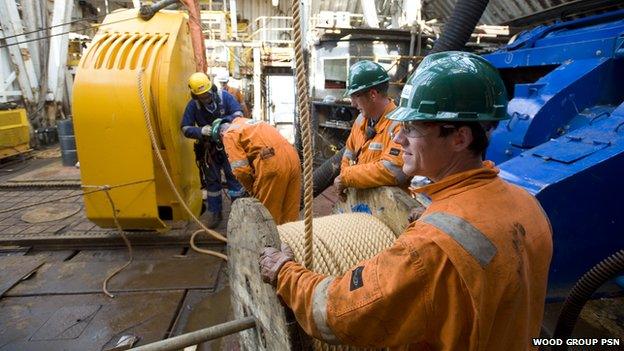Wood Group cuts 5,000 jobs on oil price fall
- Published

Oil services firm Wood Group has cut 5,000 jobs this year as the fall in the price of oil has hit profits.
Pre-tax profit for the first six months of this year was $160.2m (£102.9), down from $233.3m a year earlier. Total revenue was down almost 20% at $3.1bn.
About 1,000 jobs went in the UK, 3,000 in the US and 1,000 in the Middle East. The Aberdeen-based group employed some 40,000 workers in December last year.
The group announced in February that it would be cutting jobs to cut costs.
"Conditions in oil and gas markets remain very challenging," said Wood Group's chief executive, Bob Keiller, external.
"With little prospect of short term improvement in market conditions, we will focus on remaining competitive and protecting our capability, working with clients to reduce their overall costs, increase efficiency and safely improve performance."
He added that, despite the fall in half-year profits, the company's outlook for the full year remained unchanged. It added that total cost savings for the full year would be in excess of $80m.
The company also said it was taking on more workers on certain projects in Asia.
Wood Group is one of the biggest oil and gas services companies working in the North Sea, where operators have been hit particularly hard by the fall in the oil price.
The price of Brent crude has dropped by more than 50% in the past 12 months to $48.60 a barrel.

Analysis: Kamal Ahmed, BBC business editor
Wood Group is in the oil and gas services industry - providing the plumbing for the likes of BP and Shell which explore for and refine oil. Wood Group builds and supports the vital engineering and technical infrastructure to do it.
The whole sector is important, worth £27bn to the British economy. Malcolm Webb, the former chief executive of Oil and Gas UK, described it as a "core component of the UK's engineering and manufacturing base".
And it is for that reason that it is worth listening when Wood Group chief Bob Keiller says that - despite the rapid fall in the oil price - the North Sea is still a vital part of the UK's manufacturing future.
"We have a fantastic engineering skills base here in the UK," Mr Keiller said.
"It creates high quality job opportunities that can be exported to many different countries around the world."
Engineering skills are a valuable export for the UK and go some way to rebalancing the British economy, seen by many as too reliant on the financial services of the City for comfort.
"[It] often goes unnoticed," Mr Keiller says. "There is a legacy that should not easily be let go. Collectively we need to work together to protect that skills base."
